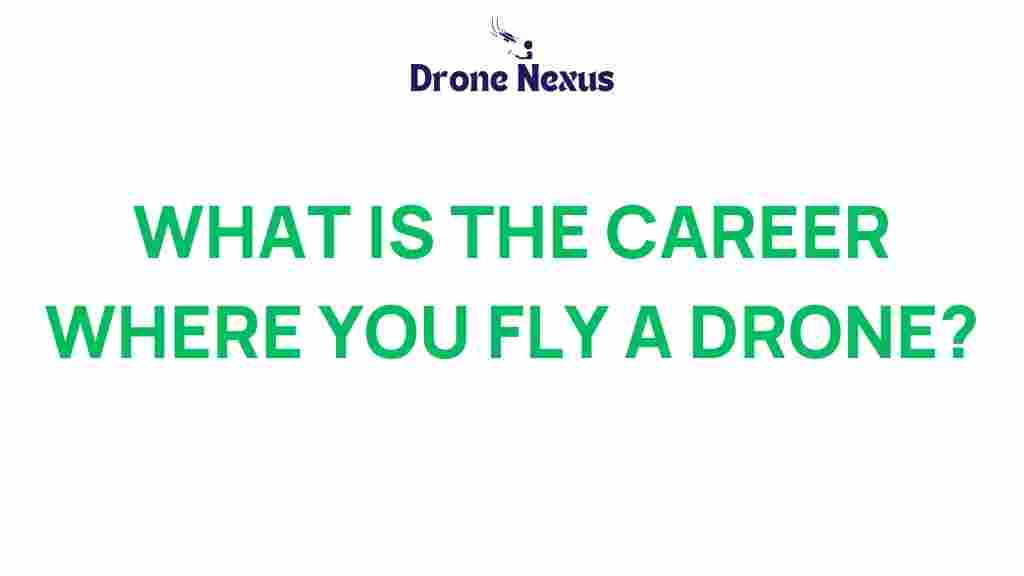Discover the Exciting Career Paths in Drone Flight: Your Guide to Drone Careers
The rise of drone technology has opened up a plethora of opportunities in various industries, making drone careers more appealing than ever. Whether you’re a tech enthusiast, a photography buff, or someone interested in logistics, there’s a drone career path for you. In this article, we will explore the diverse fields within the drone industry, the steps to embark on a drone career, and some troubleshooting tips for aspiring drone pilots.
The Growing Demand for Drone Professionals
As businesses increasingly recognize the benefits of drone technology, the demand for skilled professionals in this field continues to grow. Drones are now being used for:
- Aerial photography and videography
- Surveying and mapping
- Agricultural monitoring
- Delivery services
- Search and rescue operations
This demand creates numerous opportunities for individuals seeking to enter the world of drone careers. According to the Federal Aviation Administration (FAA), the drone industry is projected to expand significantly over the next few years, further solidifying its place in the job market.
Popular Career Paths in Drone Flight
There are several exciting career paths you can pursue within the drone industry, each offering unique challenges and rewards. Here are some of the most popular drone careers:
1. Drone Pilot
As a drone pilot, you will operate unmanned aerial vehicles (UAVs) for various purposes, including photography, surveying, and monitoring. To become a licensed drone pilot, you must pass the FAA Part 107 exam, which covers regulations, airspace classification, and weather.
2. Drone Technician
Drone technicians are responsible for the maintenance and repair of UAVs. This role requires a strong understanding of electronics and mechanics, as well as troubleshooting skills to identify and fix issues.
3. Aerial Photographer/Videographer
If you have a passion for photography or videography, specializing in aerial imaging with drones might be your dream job. You’ll capture stunning visuals for real estate, events, and marketing campaigns.
4. Surveyor or Mapper
Drones are revolutionizing the surveying and mapping industry. As a drone surveyor, you’ll use UAVs equipped with advanced sensors and cameras to collect data for construction, agriculture, and environmental projects.
5. Agricultural Drone Specialist
In agriculture, drones are used for crop monitoring, irrigation analysis, and more. An agricultural drone specialist focuses on utilizing drones to enhance farming practices and improve yield.
Steps to Embark on a Drone Career
Ready to dive into the world of drone careers? Here’s a step-by-step guide to help you get started:
Step 1: Get Educated
While a formal degree isn’t always necessary, having a foundation in aviation, technology, or photography can be beneficial. Many community colleges and online platforms offer courses in drone piloting and technology.
Step 2: Obtain Your License
For most drone careers, particularly as a pilot, obtaining your FAA Part 107 Remote Pilot Certificate is essential. This involves:
- Studying for the exam
- Passing the FAA knowledge test
- Submitting an application
Step 3: Gain Experience
Hands-on experience is crucial in the drone industry. Consider starting with recreational flying or volunteering for projects to build your portfolio. Networking with professionals in the field can also provide valuable insights.
Step 4: Specialize
As you gain experience, consider specializing in a specific area of drone operation. This could include aerial photography, surveying, or agricultural applications. Specialization can help you stand out in a competitive job market.
Step 5: Stay Updated
The drone industry is constantly evolving. Keeping up with the latest technology, regulations, and industry trends is crucial. Join professional organizations and attend workshops to stay informed.
Troubleshooting Tips for Aspiring Drone Pilots
As you embark on your journey in drone careers, you may encounter challenges. Here are some troubleshooting tips to help you navigate common issues:
- Drone Won’t Connect: Ensure the drone’s battery is charged and that you’re within the operational range. Restart both the drone and the remote control.
- GPS Signal Loss: Fly in open areas away from tall buildings and trees. Check for firmware updates to improve GPS accuracy.
- Camera Issues: If the camera isn’t functioning, check the connections and settings. Ensure the lens is clean for optimal image quality.
- Battery Problems: Regularly check the battery health and avoid over-discharge to extend its lifespan.
Conclusion
The field of drone careers offers exciting opportunities for individuals passionate about technology and innovation. From piloting drones to specializing in agriculture or photography, the possibilities are vast. By following the outlined steps and preparing for challenges, you can successfully navigate your journey into the world of drones. Remember, as the industry continues to grow, so will your career prospects. Stay dedicated, keep learning, and who knows? You may find yourself leading the charge in this thrilling field.
For more information on drone-related education and resources, check out this helpful guide to further enhance your skills and knowledge.
This article is in the category Applications and created by DroneNexus Team
